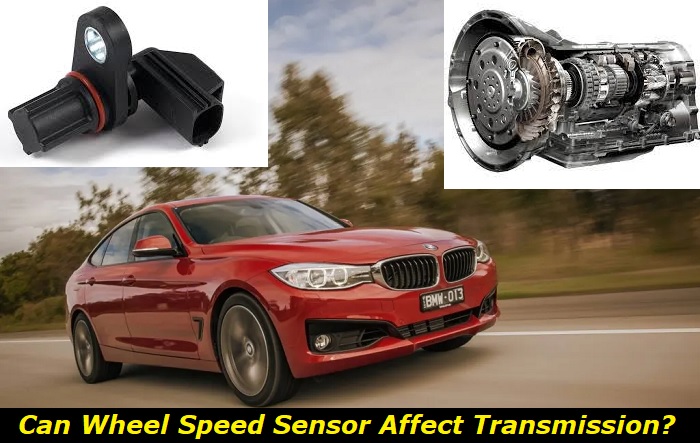The intricate electrical systems of vehicles can oftentimes be confusing, so it's not surprising that a lot of car owners are mystified. One frequently asked question is whether or not a wheel speed sensor has an effect on transmission performance. Yes, in fact - if you have a defective wheel speed sensor, it can create troubles with the transmission system.
Electrical gremlins highlights
- Level of urgency:medium
- DIY inspection:impossible
- DIY repair:impossible
- Can you drive?yes
- Price for repairs:$0 - $300
- Symptoms:glitch, unusual behavior, temporary problem
- Ways to solve:check the battery voltage, check wiring and connections, take it to a professional mechanic

What Is a Wheel Speed Sensor and How Does It Work?
A wheel speed sensor, also known as an ABS (anti-lock braking system) or VSS (vehicle speed sensor), is a type of electronic device that measures the rotational speed of a vehicle's wheel. Wheel speed sensors use Hall Effect technology to detect changes in rotation and convert them into electrical signals.
These signals are then sent to the vehicle's ECU (electronic control unit), where they are interpreted and used to automatically adjust the braking system, as well as other aspects of a vehicle's performance. By monitoring wheel speed in real-time, ABS systems can help ensure that the brakes remain engaged even during sudden stops or when taking sharp turns.
This helps to prevent skidding and other dangerous situations on the road. Wheel speed sensors are also used for traction control, stability control, and even cruise control systems in modern vehicles.
The most common type of wheel speed sensor is a passive infrared (PIR) sensor. PIR sensors utilize infrared radiation from the surface of the wheel to generate an electrical signal. The signal is then sent to the ECU, where it is compared with pre-set values, and if there is a difference, appropriate action is taken to adjust the braking system or other systems accordingly.
Wheel speed sensors are usually mounted on the wheel hubs of vehicles, but they can also be installed in the suspension or transmission. To ensure accurate readings, wheel speed sensors must be properly calibrated to the vehicle's specifications. This is usually done by a professional mechanic during routine maintenance.
In order to ensure the highest levels of safety on our roads, wheel speed sensors are now an essential component of modern vehicles. Not only do they monitor wheel speed in real-time and immediately adjust the braking system accordingly, but ABS systems can also be used for traction control and cruise control systems - giving drivers a powerful tool with which to make their journeys safer.
Taking proactive measures for your vehicle is always a good idea, especially when it comes to wheel speed sensors. Have them inspected on a regular basis by an experienced mechanic in order to guarantee that your car is operating at its optimum efficiency and safety standards. If the part appears damaged or aged, be sure to replace it promptly with quality components in order to avert any potential risks!
How Can Wheel Speed Sensor Affect Transmission?
The wheel speed sensor measures the rotational speed of each individual wheel, as well as their direction and rate of acceleration or deceleration. This data is used by a vehicle's transmission control module (TCM) to help determine when it needs to shift gears.
For example, if the wheels are spinning faster than normal, the TCM may decide that it's time to downshift or upshift. If the wheels are not spinning as quickly, the TCM may decide that it should delay a gear shift until more power is needed. This helps to improve a vehicle's fuel efficiency and maintain optimal performance levels.
Additionally, some vehicles also use wheel speed sensors to provide input for antilock braking systems, traction control systems, and electronic stability control. By monitoring the speed of each wheel independently, these systems can detect when one or more wheels have lost traction and quickly compensate accordingly. This helps to keep a vehicle stable during difficult driving conditions.
If the wheel speed sensor isn't functioning properly, it can cause problems with shifting, acceleration, and other aspects of the car's performance. In some cases, a malfunctioning wheel speed sensor can even lead to transmission damage. To prevent this, it's important to have the wheel speed sensor checked and replaced when necessary.
Can Wheel Speed Sensor Affect Brakes?
Yes, wheel speed sensors can significantly affect the performance of a vehicle's brakes. This is because they provide input to the electronic system that controls the brake calipers. By monitoring how quickly each wheel is spinning or decelerating, the system can adjust the pressure on the brake calipers accordingly in order to ensure that they are providing adequate stopping power.
If a wheel speed sensor is malfunctioning, it can cause the brake system to misread the wheels' speeds and apply too much or too little pressure on the calipers. This could lead to inadequate braking and even an increased risk of accidents.
Can You Drive with a Faulty Wheel Speed Sensor?
No, it is not recommended to drive with a faulty wheel speed sensor. As mentioned above, a malfunctioning wheel speed sensor can cause all sorts of issues related to shifting, acceleration, and braking. It also compromises the safety of all other drivers on the road by making your vehicle less responsive and more prone to accidents. Therefore, it's important to have it checked and repaired or replaced as soon as possible.
What Can Cause a Wheel Speed Sensor to Malfunction?
Wheel speed sensors are exposed to a lot of wear and tear, which can cause them to malfunction over time. Common causes include physical damage from road debris or corrosion, dirt buildup, and faulty wiring connections. Additionally, the sensor can suffer from electronic failure due to voltage spikes or short circuits.
What Error Codes You May Receive Due to a Faulty Wheel Speed Sensor?
Depending on the type of vehicle you are driving, you may receive different error codes related to a faulty wheel speed sensor. Common error codes include: P0500 (vehicle speed sensor malfunction) and C0044 (wheel speed sensor circuit failure). If any of these codes appear, it's important to have the wheel speed sensor checked and replaced as soon as possible.
How Much Will It Cost to Replace a Faulty Wheel Speed Sensor?
The cost of replacing a wheel speed sensor can vary depending on the type and model of your vehicle. Generally speaking, though, it will likely range anywhere from $50 to $300 per wheel speed sensor. It's important to note that labor costs may also be involved, so you'll want to factor this in when budgeting for repairs.
Bottom Line
The modern car could not run properly without wheel speed sensors. These components provide crucial data on the wheels' rotational velocity, orientation, and deceleration or acceleration to the transmission control module (TCM). This information is then used by other systems like traction control as well as for gear-changing decisions.
If a malfunction occurs with these sensors, it can damage your transmission and cause several performance issues too. For this reason, have them regularly inspected by an experienced mechanic and replaced if needed - doing so will ensure that you get optimal performance out of your vehicle!
Make sure your vehicle is running its best and that you're secure on the road by having a properly functioning wheel speed sensor. It's imperative to inspect it regularly and replace any worn-out components with high-grade replacements - it'll be worth it in the long run!
About the authors
The CarAraC research team is composed of seasoned auto mechanics and automotive industry professionals, including individuals with advanced degrees and certifications in their field. Our team members boast prestigious credentials, reflecting their extensive knowledge and skills. These qualifications include: IMI: Institute of the Motor Industry, ASE-Certified Master Automobile Technicians; Coventry University, Graduate of MA in Automotive Journalism; Politecnico di Torino, Italy, MS Automotive Engineering; Ss. Cyril and Methodius University in Skopje, Mechanical University in Skopje; TOC Automotive College; DHA Suffa University, Department of Mechanical Engineering






Add comment